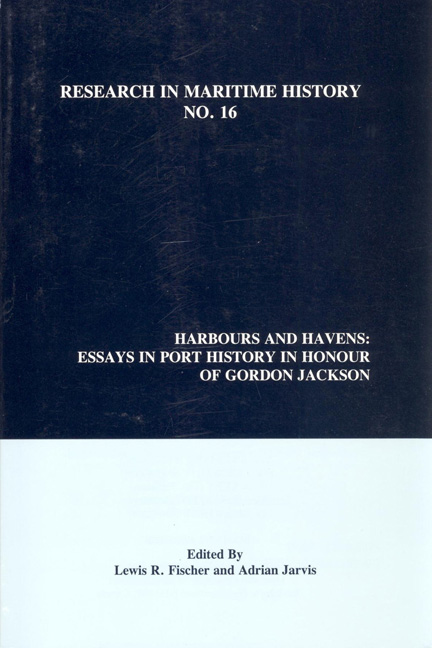Book contents
- Frontmatter
- Contents
- About the Editors
- Contributors
- Introduction
- “Gordon Jackson: An Appreciation”
- “Port History: Some Thoughts on Where it Came from and Where it Might be Going”
- “Port Politics: Interest, Faction and Port Management in Mid-Victorian Liverpool”
- “Our Little Company:' The Wilsons and North Eastern Railway Shipping Company Limited, 1906-1935”
- “The Changing Functions of a Rural Port: Dumfries, 1700-1850”
- “Australian Ports Since 1945”
- “Aspinall, Cornes and Company and the Early Development of the Port of Yokohama”
- “Dubai: From Creek to Global Port City”
- “New York's German Suburb: The Creation of the Port of Bremerhaven, 1827-1918”
- “Capital and Labour in the Port Town of Esbjerg, 1945- 1999”
- “Port Policies: Seaport Planning around the North Atlantic, 1850-1939”
- “Gordon Jackson: A Bibliography”
“Gordon Jackson: An Appreciation”
- Frontmatter
- Contents
- About the Editors
- Contributors
- Introduction
- “Gordon Jackson: An Appreciation”
- “Port History: Some Thoughts on Where it Came from and Where it Might be Going”
- “Port Politics: Interest, Faction and Port Management in Mid-Victorian Liverpool”
- “Our Little Company:' The Wilsons and North Eastern Railway Shipping Company Limited, 1906-1935”
- “The Changing Functions of a Rural Port: Dumfries, 1700-1850”
- “Australian Ports Since 1945”
- “Aspinall, Cornes and Company and the Early Development of the Port of Yokohama”
- “Dubai: From Creek to Global Port City”
- “New York's German Suburb: The Creation of the Port of Bremerhaven, 1827-1918”
- “Capital and Labour in the Port Town of Esbjerg, 1945- 1999”
- “Port Policies: Seaport Planning around the North Atlantic, 1850-1939”
- “Gordon Jackson: A Bibliography”
Summary
Englishmen like to tell visitors that if they are bored by the current vista, all they need do is travel a few miles to experience scenery that is totally different. This amazing variety is truly one of the joys of the British Isles.. Yet even by such lofty standards, Lincolnshire is an especially diverse unit. This is true in several ways. For starters, it is spatially one of the largest of the counties. It is also highly heterogeneous economically: part of it comprises rich agricultural lands, while other areas have given rise to mining, manufacturing and fishing industries. Indeed, some geographers have questioned whether Lincolnshire forms any kind of coherent whole. While travellers who visited the region between the Middle Ages and the nineteenth century almost always commented on the diversity of topography and economy, most tended nonetheless to see a kind of unity in its people, who were most often described as “pious,” “industrious“ and, most typically, “independent.” These attributes perfectly describe Gordon Jackson, Lincolnshire born and bred.
Gordon is proud of his Lincolnshire roots, yet if you ask him where he is from, his answer usually is far more specific: he will tell you that he is from Cleethorpes, where he was born on 14 April 1934. If you listen carefully, however, you will soon discover that what he really means is that he is from the northeastern part of Lincolnshire. For a maritime historian who, like Gordon, has written with a special passion about whaling and ports, there is perhaps no more fitting birthplace, for this area includes Grimsby, long the largest fishing port in the country, and across the Humber, where Lincolnshire blends into Yorkshire, is Hull, historically one of Britain's most important ports (and a centre of whaling as well). A boy growing up in this region in the years spanning the Second World War could hardly avoid being touched by the sea.
Gordon, in perhaps this way alone, was typical. It must be admitted, though, that Cleethorpes was a very special kind of maritime town. A quiet backwater until the 1860s, it was transformed into an important tourist destination by the arrival in 1863 of the Manchester, Sheffield and Lincolnshire Railway, which brought holiday makers down the coast from Hull and Grimsby.
- Type
- Chapter
- Information
- Harbours and HavensEssays In Port History In Honour Of Gordon Jackson, pp. 1 - 12Publisher: Liverpool University PressPrint publication year: 1998



